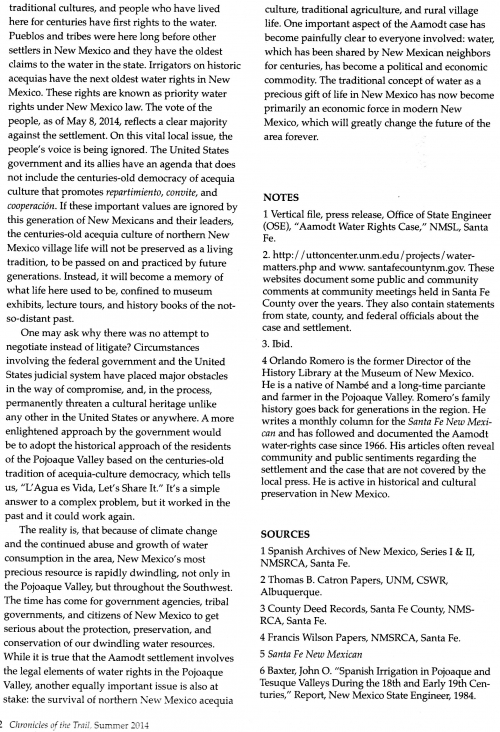- img108_2.jpg (774 Downloads)
Michael Miller
I grew up in Santa Fe in the 1950's and 60's. I graduated from St. Mikes's in 1967. I served as Director of the New Mexico Records Center and Archives, Director of the Center for Southwest Research, UNM, and retired as Director of Research and Literary Arts at the National Hispanic Cultural Center of New Mexico. Today, I am involved in the preservation of New Mexico's environment and cultural heritage. I volunteer for a number of organizations and I am particularly interested in working with young people. I believe that the traditional values of NM and the rich heritage passed on by our ancestors is one of the most important ways to reach out to our young people and help eliminate many of the social, economic, environmental, and political problems created in the 21st century. Family values, culture, tradition, respect for the Earth, spirituality, preservation of our natural resources and traditional knowledge must be passed on to the next generation to help them cope with the world today. I believe that it is the responsibility of every adult to mentor and nourish the minds of the young. I enjoy flyfishing, bow hunting, farming, and the wonders of nature. Bibliography of published work is available on request.
Latest from Michael Miller
2 comments
-
Comment Link
 Sunday, 29 March 2015 19:21
posted by Arthur Scott
Sunday, 29 March 2015 19:21
posted by Arthur Scott
Very interesting, Michael and a subject close to my heart. You are touching on a pervasive and widespread problem. I spent a 38-year career working for the USGS on water issues. Just a few personal thoughts.
The problem is simple--too many people with conflicting demands on a limited resource. The solution is not simple, very complex and no one wins. The acequia system worked in the past because it only concerned local interests apportionment and not a broad area. It is historically significant but not of any use in today's world.
Some facts to consider on the Rio Grande as a whole. Its waters are governed by a three state federal compact between Colorado, New Mexico and Texas. Additionally the needs of an international treaty between Mexico and the United States must be met. Within in each entity, there are conflicting needs; household use, livestock water, agricultural irrigation, recreational use and its economic impacts, and environmental needs to maintain habitat etc. All of these have to be prioritized. And to make thinks even more interesting are inter-stream diversions between the San Juan Basin and the Rio Grande basin.
To muddy the legal waters" a bit more are the aboriginal Native American water rights which be met and were governed by the Winter's doctrine upheld by the Supreme Court in 1908. An excellent paper by the UNM law school is:
http://uttoncenter.unm.edu/pdfs/American_Indian_Water_Right_Settlements.pdf
I did learn in 38 years that the surest way to water conservation in economic. The more water costs, the less it is used and/or wasted.
A very wise man, Dr, Luna Leopold, former Chief Hydrologist for the USGS; once said many years ago, "Our next wars will not be over oil, but rather over water."















